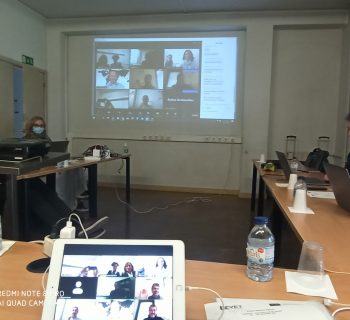 My new year intentions to post more regularly here got disrupted quickly by a bad cold and a week of travel. But I'm back in the saddle. There are two major themes running through my work at the moment (and overlapping to an extent: initial teacher training and continuous professional development for teachers and trainers and the impact of new technologies, especially Artificial Intelligence of both education and employment. So, here is the first of a series of posts on those subjects (though probably not in any particular order).
My new year intentions to post more regularly here got disrupted quickly by a bad cold and a week of travel. But I'm back in the saddle. There are two major themes running through my work at the moment (and overlapping to an extent: initial teacher training and continuous professional development for teachers and trainers and the impact of new technologies, especially Artificial Intelligence of both education and employment. So, here is the first of a series of posts on those subjects (though probably not in any particular order).
I've been doing some research into the training of teachers in Sub Saharan Africa. The major issue is the shortage of qualified teachers, which is of such a scale that there seems little no hope of overcoming by tradition pre service teacher training institutions. Also scaling up provision through teacher training colleges is problematic due to the size of many African countries and the rural nature of much of those countries. Part of the problem in many countries in Sub Saharan African countries is the lack of prestige in which teaching is held and the low pay for teachers. That being said, there still remains a major challenge in terms of training new teachers and in providing continuing professional development for existing teachers.
In this situation, it is little wonder that attention is focused on the use of ICT for teacher education. It is probably fair to say that despite the issues of connectivity and access to technology, Technology Enhanced Learning is seen as the only real answer for the shortage of teachers in many countries in the region. This is despite Infodev's findings in its Knowledge Bank on the effective uses of Information and Communication Technology in education in developing countries that:
While much of the rhetoric (and rationale) for using ICTs to benefit education has focused on ICTs' potential for bringing about changes in the teaching-learning paradigm, in practice, ICTs are most often used in education in LDCs to support existing teaching and learning practices with new (and, it should be noted, often quite expensive!) tools.
Infodev goes on to say:
While impact on student achievement is still a matter of reasonable debate, a consensus seems to argue that the introduction and use of ICTs in education can be a useful tool to help promote and enable educational reform, and that ICTs are both important motivational tools for learning and can promote greater efficiencies in education systems and practices.
Firstly, I must say my research is limited. But I have read the literature and reports and undertaken about 30 interviews with people in Africa working on various projects for developing capacity in teacher education. And it seems that possibly understandably the emergent model is blended learning combining short face to face training programmes with longer periods of online learning, whilst based in the school. Its not a bad model, especially if support for teachers while learning in the workplace (i.e. the school) is well designed and well supported. My worry is with the training for people supporting the school based learning. Essentially the projects appear to be adopting a cascade model. And although cascade models are attractive in terms of quickly scaling up learning, they can be 'leaky', breaking down at the weakest point in the cascade train.
I don't think there are any immediate answers to this problem. I think we need more south-north dialogue and interchange if only that northern countries including in Europe face huge problems in providing professional development for teachers in the use of technology in the classroom. I also think we need to examine the different models more carefully, especially in understanding the assumptions we are miking in designing new training and professional development provision. Without understanding the assumptions we cannot evaluate the success (or otherwise).








